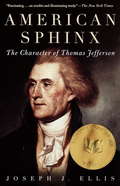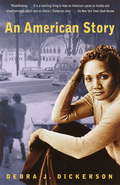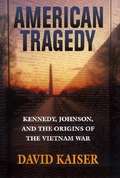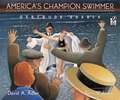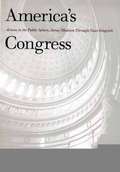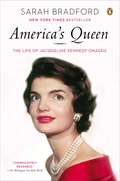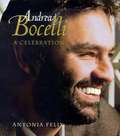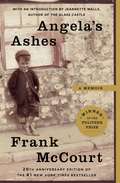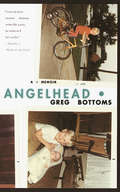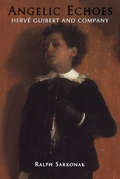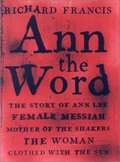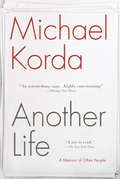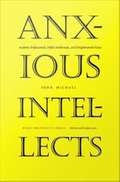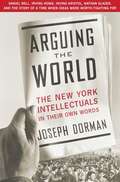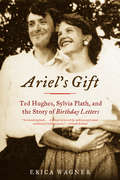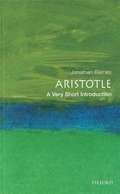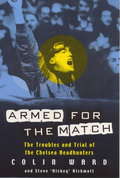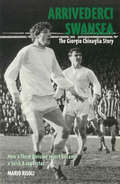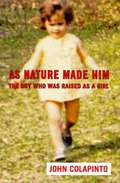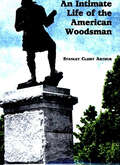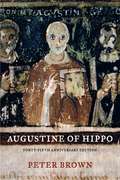- Table View
- List View
American Sphinx: The Character of Thomas Jefferson (American History Ser.)
by Joseph J. EllisFor a man who insisted that life on the public stage was not what he had in mind, Thomas Jefferson certainly spent a great deal of time in the spotlight--and not only during his active political career. After 1809, his longed-for retirement was compromised by a steady stream of guests and tourists who made of his estate at Monticello a virtual hotel, as well as by more than one thousand letters per year, most from strangers, which he insisted on answering personally. In his twilight years Jefferson was already taking on the luster of a national icon, which was polished off by his auspicious death (on July 4, 1826); and in the subsequent seventeen decades of his celebrity--now verging, thanks to virulent revisionists and television documentaries, on notoriety--has been inflated beyond recognition of the original person.<P><P> For the historian Joseph J. Ellis, the experience of writing about Jefferson was "as if a pathologist, just about to begin an autopsy, has discovered that the body on the operating table was still breathing." In American Sphinx, Ellis sifts the facts shrewdly from the legends and the rumors, treading a path between vilification and hero worship in order to formulate a plausible portrait of the man who still today "hover[s] over the political scene like one of those dirigibles cruising above a crowded football stadium, flashing words of inspiration to both teams." For, at the grass roots, Jefferson is no longer liberal or conservative, agrarian or industrialist, pro- or anti-slavery, privileged or populist. He is all things to all people. His own obliviousness to incompatible convictions within himself (which left him deaf to most forms of irony) has leaked out into the world at large--a world determined to idolize him despite his foibles.<P> From Ellis we learn that Jefferson sang incessantly under his breath; that he delivered only two public speeches in eight years as president, while spending ten hours a day at his writing desk; that sometimes his political sensibilities collided with his domestic agenda, as when he ordered an expensive piano from London during a boycott (and pledged to "keep it in storage"). We see him relishing such projects as the nailery at Monticello that allowed him to interact with his slaves more palatably, as pseudo-employer to pseudo-employees. We grow convinced that he preferred to meet his lovers in the rarefied region of his mind rather than in the actual bedchamber. We watch him exhibiting both great depth and great shallowness, combining massive learning with extraordinary naïveté, piercing insights with self-deception on the grandest scale. We understand why we should neither beatify him nor consign him to the rubbish heap of history, though we are by no means required to stop loving him. He is Thomas Jefferson, after all--our very own sphinx.<P> Winner of the National Book Award
An American Story
by Debra J. DickersonA profoundly courageous and insightful memoir, An American Story documents the events that have shaped journalist Debra Dickerson's conscience.The daughter of former sharecroppers, Dickerson never imagined she would emerge from her squalid St. Louis neighborhood to become an acclaimed journalist with a Harvard Law degree. A constant reader and a straight-A student, nevertheless Dickerson's lack of confidence kept her from accepting the many colleges offers she received. Instead she enlisted in the U.S. Air Force, quickly rising through the ranks. In spite of her success, she recognized within herself deep-seated conflict at being a working class black woman living in a white man's world. Her path to self-acceptance is at the heart of this refreshing narrative.From the Trade Paperback edition.
American Tragedy: Kennedy, Johnson, and the Origins of the Vietnam War
by David E. KaiserFought as fiercely by politicians and the public as by troops in Southeast Asia, the Vietnam War--its origins, its conduct, its consequences--is still being contested. In what will become the classic account, based on newly opened archival sources, David Kaiser rewrites what we know about this conflict. Reviving and expanding a venerable tradition of political, diplomatic, and military history, he shows not only why we entered the war, but also why our efforts were doomed to fail. American Tragedy is the first book to draw on complete official documentation to tell the full story of how we became involved in Vietnam--and the story it tells decisively challenges widely held assumptions about the roles of Eisenhower, Kennedy, and Johnson. Using an enormous range of source materials from these administrations, Kaiser shows how the policies that led to the war were developed during Eisenhower's tenure and nearly implemented in the closing days of his administration in response to a crisis in Laos; how Kennedy immediately reversed course on Laos and refused for three years to follow recommendations for military action in Southeast Asia; and how Eisenhower's policies reemerged in the military intervention mounted by the Johnson administration. As he places these findings in the context of the Cold War and broader American objectives, Kaiser offers the best analysis to date of the actual beginnings of the war in Vietnam, the impact of the American advisory mission from 1962 through 1965, and the initial strategy of General Westmoreland. A deft re-creation of the deliberations, actions, and deceptions that brought two decades of post-World War II confidence to an ignominious end, American Tragedy offers unparalleled insight into the Vietnam War at home and abroad--and into American foreign policy in the 1960s.
America's Champion Swimmer: Gertrude Ederle
by David A. Adler Terry WidenerTrudy Ederle loved to swim, and she was determined to be the best. At seventeen Trudy won three medals at the 1924 Olympics in Paris. But what she planned to do next had never been done by a woman: She would swim across the English Channel in fourteen hours and set a world record.
America's Congress: James Madison Through Newt Gingrich
by David R. MayhewTo understand American politics and government, we need to recognize that members of Congress are more than agents of societal interests and preferences -- they also act with some autonomy and consequence in the public sphere. In this illuminating book, a distinguished political scientist examines the actions of members of Congress throughout American history, assessing their patterns and importance and their role in the U. S. system of separation of powers.
America's Queen: The Life of Jacqueline Kennedy Onassis
by Sarah BradfordAcclaimed biographer Sarah Bradford explores the life of Jacqueline Kennedy Onassis, the woman who has captivated the public for more than five decades, in a definitive portrait that is both sympathetic and frank. With an extraordinary range of candid interviews--many with people who have never spoken in such depth on record before--Bradford offers new insights into the woman behind the public persona. She creates a coherent picture out of Jackie's tumultuous and cosmopolitan life--from the aristocratic milieu of Newport and East Hampton to the Greek isles, from political Washington to New York's publishing community. She probes Jackie's privileged upbringing, her highly public marriages, and her roles as mother and respected editor, and includes rare photos from private collections to create the most complete account yet written of this legendary life.
America's Queen: The Life of Jacqueline Kennedy Onassis
by Sarah BradfordAcclaimed biographer Sarah Bradford explores the life of Jacqueline Kennedy Onassis, the woman who has captivated the public for more than five decades, in a definitive portrait that is both sympathetic and frank. With an extraordinary range of candid interviews--many with people who have never spoken in such depth on record before--Bradford offers new insights into the woman behind the public persona. She creates a coherent picture out of Jackie's tumultuous and cosmopolitan life--from the aristocratic milieu of Newport and East Hampton to the Greek isles, from political Washington to New York's publishing community. She probes Jackie's privileged upbringing, her highly public marriages, and her roles as mother and respected editor, and includes rare photos from private collections to create the most complete account yet written of this legendary life.
Andrea Bocelli: A Celebration
by Antonia FelixThe author presents text and pictures from Andrea Bocelli's life. Information concerning how different conductors worked with Andrea as he made his entrance in the opera are included.
Angela's Ashes: A Memoir (Scholastic Elt Readers Ser.)
by Frank Mccourt"When I look back on my childhood I wonder how I managed to survive at all. It was, of course, a miserable childhood: the happy childhood is hardly worth your while. Worse than the ordinary miserable childhood is the miserable Irish childhood, and worse yet is the miserable Irish Catholic childhood." So begins the luminous memoir of Frank McCourt, born in Depression-era Brooklyn to recent Irish immigrants and raised in the slums of Limerick, Ireland. Frank's mother, Angela, has no money to feed the children since Frank's father, Malachy, rarely works, and when he does he drinks his wages. Yet Malachy -- exasperating, irresponsible and beguiling-- does nurture in Frank an appetite for the one thing he can provide: a story. Frank lives for his father's tales of Cuchulain, who saved Ireland, and of the Angel on the Seventh Step, who brings his mother babies. Perhaps it is story that accounts for Frank's survival. Wearing rags for diapers, begging a pig's head for Christmas dinner and gathering coal from the roadside to light a fire, Frank endures poverty, near-starvation and the casual cruelty of relatives and neighbors--yet lives to tell his tale with eloquence, exuberance and remarkable forgiveness. Angela's Ashes, imbued on every page with Frank McCourt's astounding humor and compassion, is a glorious book that bears all the marks of a classic.<P><P> Pulitzer Prize Winner
Angelhead: My Brother's Descent into Madness
by Greg BottomsA taut, powerful memoir of madness, Angelhead documents the violent, drug-addled descent of the author's brother, Michael, into schizophrenia. Beginning with Michael's first psychotic break--seeing God in his suburban bedroom window while high on LSD--Greg Bottoms recounts, in gripping, dramatic prose, the bizarre disappearances, suicide attempts, and the shocking crime that land Michael in the psychiatric wing of a maximum security prison. A work of nonfiction with the form and imagery of a novel, Angelhead enables the reader to witness not only the fragmenting of a mind, but of a family as well. "A tour-de-force memoir. . . . Bottoms writes like a poet, he writes like he is on fire." --Esquire, Book of the Year, 2000. "Angelhead is a brilliant, albeit inconceivably sad book. The fact that Bottoms survived the ordeal is incredible. But the fact that he could write about it with such pathos and insight is nothing less than extraordinary. "--Atlanta Journal-Constitution. "Greg Bottoms has provided a biographical novel about his brother that may be as close as most of us will ever get to knowing what it is to be truly mad. Angelhead is a story nearly as terrifying as the disease it describes. "--Psychology Today.
Angelic Echoes: Hervé Guibert and Company
by Ralph SarkonakIn 1990 Hervé Guibert gained wide recognition and notoriety with the publication of "À l'ami qui ne m'a pas sauvé la vie (To the Friend Who Did Not Save My Life)". This novel, one of the most famous AIDS fictions in French or any language, recounts the battle of the first-person narrator not only with AIDS but also with the medical establishment on both sides of the Atlantic. Photography critic for Le Monde from 1977-1985, Guibert was also the co-author (with Patrice Chéreau) of a film script, L'Homme Blessé, which won a César in 1984, and author of more than twenty-five books, eight of which have been translated into English. In this vibrant and unusual study, Ralph Sarkonak examines many intriguing aspects of Guibert's life and production: the connection between his books and his photography, his complex relationship with Roland Barthes and with his friend and mentor Michel Foucault (relationships that were at once literary, intellectual, and personal in each case); the ties between his writing and that of his contemporaries, including Renaud Camus, France's most prolific gay writer; and his development of an AIDS aesthetic. Using close textual analysis, Sarkonak tracks the convolutions of Guibert's particular form of life-writing, in which fact and fiction are woven into a corpus that evolves from and revolves around his preoccupations, obsessions, and relationships, including his problematic relationship with his own body, both before and after his HIV-positive diagnosis. Guibert's work is a brilliant example of the emphasis on disclosure that marks recent queer writing – in contrast to the denial and cryptic allusion that characterized much of the work by gay writers of previous generations. Yet, as Sarkonak concludes, Guibert treats the notions of falsehood and truth with a postmodern hand: as overlapping constructs rather than mutually exclusive ones – or, to use Foucault's expression, as "games with truth."
Ann the Word: The Story of Ann Lee, Female Messiah, Mother of the Shakers, the Woman Clothed with the Sun
by Richard FrancisFrom Publishers Weekly Ann Lee (1736-1784) was an illiterate who left no records of her own, making the biographer's task a challenge. Francis has culled this entertaining profile from public records of Lee's many incarcerations for disorderly conduct (those early Shakers were a loud bunch) and her followers' glowing recollections. Francis dispels some myths about Lee, including the notion that she "founded" the Shaker movement, which had been going for 11 years before she converted in 1758. In 1770, she had a vision in which she saw herself as a Messiah figure, and thereafter assumed spiritual leadership, bringing a small flock of believers to America in 1774. Francis does a fine job of placing early Shakerism within the larger context of the Revolutionary War and gives long-overdue attention to the historical import of the "Dark Day" of 1780. Francis is a fine writer who vividly conjures the religious and social worlds of the 18th century, though his allusions to popular 20th-century entertainments (Monty Python, Stephen King and the movie Groundhog Day) are more distracting than illustrative. The lack of citations of any kind is troublesome in a biography where so much of the "primary" source material was penned long after Lee's death; occasional glitches on Francis's part (e.g., calling the Anglican revivalist George Whitefield a Methodist) also undermine reader confidence. Despite these flaws, this is unquestionably the best and most absorbing biography of the irrepressible Shaker leader.
Another Life: A Memoir of Other People
by Michael KordaIn his remarkable memoir, at once frank, audacious, canny, and revealing, Michael Korda, the author of Charmed Lives and Queenie, does for the world of books what Moss Hart did for the theater in Act One, and succeeds triumphantly in making publishing seem as exciting (and as full of great characters) as the stage.Another Life is not just an adventure--the engaging and often hilarious story of a young man making his career--but the insider's story of how a cottage industry metamorphosed into a big business, with sometimes alarming results for all concerned. Korda writes with grace, humor, and a shrewd eye, not only about himself and his rise from a lowly (but not humble) assistant editor reading the "slush pile" of manuscripts to a famous editor in chief of a major publishing house, but also about the celebrities and writers with whom he worked over four decades. Here are portraits--rare, intimate, always keenly observed--of such larger-than-life figures as Ronald Reagan, affable and good-natured but the most reluctant of authors, struggling with his "ghosted" presidential autobiography; Richard Nixon, seen here as a genial, if bizarrely detached, host; superagent Irving Lazar, pursuing his endless deals and dreams of "class"; retired Mafia boss Joseph Bonanno, the last of the old-time dons, laboring over his own version of his life in his desert retreat; Joan Crawford, giving Korda her rules for successful living; and countless other greats, near greats, and would-be greats. Here too are famous writers, sometimes eccentric, sometimes infuriating, sometimes lost souls, captured memorably by someone who was close to them for years: Graham Greene, in pursuit of his FBI file and a Nobel Prize; Tennessee Williams, wrestling unsuccessfully with his demons; Jacqueline Susann, facing and conquering the dreaded "second-novel syndrome" after the stunning success of Valley of the Dolls; Harold Robbins (who had to be guarded under lock and key and made to finish his novels), struggling to keep the IRS at bay from the deck of his yacht; Carlos Castaneda, at his most sorcerously charming, described--at last--in detail, as he really was, by one of the few people who knew him well; not to mention Richard Adams, Will and Ariel Durant, Susan Howatch, S. J. Perelman, Fannie Hurst, Larry McMurtry, and many, many more. Parts of this book that have appeared in The New Yorker over the years have brought Korda great acclaim--the chapter about Jacqueline Susann has been made into a major motion picture. Here at last, entertaining and provocative and always hugely readable, is the whole story--a book as engaging and full of life as Korda's highly acclaimed memoir of his family, Charmed Lives, about which Irwin Shaw wrote: "I don't know when I have enjoyed a book more."
Another Life
by Michael KordaIn his remarkable memoir, at once frank, audacious, canny, and revealing, Michael Korda, the author of Charmed Lives and Queenie, does for the world of books what Moss Hart did for the theater in Act One, and succeeds triumphantly in making publishing seem as exciting (and as full of great characters) as the stage.Another Life is not just an adventure--the engaging and often hilarious story of a young man making his career--but the insider's story of how a cottage industry metamorphosed into a big business, with sometimes alarming results for all concerned. Korda writes with grace, humor, and a shrewd eye, not only about himself and his rise from a lowly (but not humble) assistant editor reading the "slush pile" of manuscripts to a famous editor in chief of a major publishing house, but also about the celebrities and writers with whom he worked over four decades. Here are portraits--rare, intimate, always keenly observed--of such larger-than-life figures as Ronald Reagan, affable and good-natured but the most reluctant of authors, struggling with his "ghosted" presidential autobiography; Richard Nixon, seen here as a genial, if bizarrely detached, host; superagent Irving Lazar, pursuing his endless deals and dreams of "class"; retired Mafia boss Joseph Bonanno, the last of the old-time dons, laboring over his own version of his life in his desert retreat; Joan Crawford, giving Korda her rules for successful living; and countless other greats, near greats, and would-be greats. Here too are famous writers, sometimes eccentric, sometimes infuriating, sometimes lost souls, captured memorably by someone who was close to them for years: Graham Greene, in pursuit of his FBI file and a Nobel Prize; Tennessee Williams, wrestling unsuccessfully with his demons; Jacqueline Susann, facing and conquering the dreaded "second-novel syndrome" after the stunning success of Valley of the Dolls; Harold Robbins (who had to be guarded under lock and key and made to finish his novels), struggling to keep the IRS at bay from the deck of his yacht; Carlos Castaneda, at his most sorcerously charming, described--at last--in detail, as he really was, by one of the few people who knew him well; not to mention Richard Adams, Will and Ariel Durant, Susan Howatch, S. J. Perelman, Fannie Hurst, Larry McMurtry, and many, many more. Parts of this book that have appeared in The New Yorker over the years have brought Korda great acclaim--the chapter about Jacqueline Susann has been made into a major motion picture. Here at last, entertaining and provocative and always hugely readable, is the whole story--a book as engaging and full of life as Korda's highly acclaimed memoir of his family, Charmed Lives, about which Irwin Shaw wrote: "I don't know when I have enjoyed a book more."ates. Parts of this book that have appeared in The New Yorker over the years have brought Korda great acclaim--the chapter about Jacqueline Susann has been made into a major motion picture. Here at last, entertaining and provocative and always hugely readable, is the whole story--a book as engaging and full of life as Korda's highly acclaimed memoir of his family, Charmed Lives, about which Irwin Shaw wrote: "I don't know when I have enjoyed a book more."From the Hardcover edition.
Anxious Intellects: Academic Professionals, Public Intellectuals, and Enlightenment Values
by John MichaelIntellectuals occupy a paradoxical position in contemporary American culture as they struggle both to maintain their critical independence and to connect to the larger society. In Anxious Intellects John Michael discusses how critics from the right and the left have conceived of the intellectual's role in a pluralized society, weighing intellectual authority against public democracy, universal against particularistic standards, and criticism against the respect of popular movements. Michael asserts that these Enlightenment-born issues, although not "resolvable," are the very grounds from which real intellectual work must proceed. As part of his investigation of intellectuals' self-conceptions and their roles in society, Michael concentrates on several well-known contemporary African American intellectuals, including Henry Louis Gates Jr. and Cornel West. To illuminate public debates over pedagogy and the role of university, he turns to the work of Todd Gitlin, Michael Brub, and Allan Bloom. Stanley Fish's pragmatic tome, Doing What Comes Naturally, along with a juxtaposition of Fredric Jameson and Samuel Huntington's work, proves fertile ground for Michael's argument that democratic politics without intellectuals is not possible. In the second half of Anxious Intellects, Michael relies on three popular conceptions of the intellectual--as critic, scientist, and professional--to discuss the work of scholars Constance Penley, Henry Jenkins, the celebrated physicist Stephen Hawking, and others, insisting that ambivalence, anxiety, projection, identification, hybridity, and various forms of psychosocial complexity constitute the real meaning of Enlightenment intellectuality. As a new and refreshing contribution to the recently emergent culture and science wars, Michael's take on contemporary intellectuals and their place in society will enliven and redirect these ongoing debates.
Arguing the World
by Joseph DormanFrom cafeterias to cocktail parties to the pages of influential journals of opinion, few groups of friends have argued ideas so passionately and so publicly as the writers and critics known as the New York intellectuals. A brilliantly contentious circle of thinkers, they wielded enormous influence in the second half of the twentieth century through their championing of cultural modernism and their critique of Soviet totalitarianism. Arguing the World is a portrait of four of the leading members of the group in their own words, based on the extensive interviews that formed the basis for Joseph Dorman's acclaimed film of the same name, which New York magazine named in 1999 as the Best New York Documentary. The political essayist Irving Kristol, the literary critic Irving Howe, and the sociologists Daniel Bell and Nathan Glazer are brought into sharp focus in a vivid account of one of the century's great intellectual communities. In this wide-ranging oral history, Dorman documents the lifelong political arguments of these men, from their working-class beginnings to their rise to prominence in the years following World War II, particularly through their contributions to magazines and journals like Partisan Review and Com-mentary. From the advent of the Cold War and McCarthyism, to the rise of the New Left on college campuses in the sixties, to the emergence of neoconservatism in the seventies and eighties, the group's disagreements grew more heated and at times more personal. Driven apart by their responses to these historic events, in later life the four found themselves increasingly at odds with one another. Kristol became influential in America's resurgent conservative movement and Glazer made a name for himself as a forceful critic of liberal social policy, while Bell fought to defend a besieged liberalism. Until his death in 1993, Irving Howe remained an unapologetic voice of the radical left. Weaving personal reminiscences from these towering figures with those of their friends and foes, Arguing the World opens a new window on the social and intellectual history of twentieth-century America.
Ariel's Gift: Ted Hughes, Sylvia Plath, and the Story of Birthday Letters
by Erica Wagner"This erudite critical study...breathes new life into Plath scholarship."—Publishers Weekly, starred review When Ted Hughes's Birthday Letters was published in 1998, it was greeted with astonishment and acclaim, immediately landing on the bestseller list. Few suspected that Hughes had been at work for a quarter of a century on this cycle of poems addressed to his first wife, Sylvia Plath. In Ariel's Gift, Erica Wagner explores the destructive relationship between these two poets through their lives and their writings. She provides a commentary to the poems in Birthday Letters, showing the events that shaped them and, crucially, showing how they draw upon Plath's own work. "Both narratively engaging and scholastically comprehensive."—Thomas Lynch, Los Angeles Times "Wagner has set the poems of Hughes's Birthday Letters in the context of his marriage to Plath with great delicacy."—Times Literary Supplement
Aristotle: A Very Short Introduction
by Jonathan BarnesAristotle died in the autumn of 322 BC He was sixty-two and at the height of his powers: a scholar whose scientific explorations were as wide-ranging as his philosophical speculations were profound; a teacher who enchanted and inspired the brightest youth of Greece; a public figure who lived a turbulent life in a turbulent world. He bestrode antiquity like an intellectual colossus. No man before him had contributed so much to learning. No man after him might aspire to rival his achievements.
Armed for the Match
by Colin WardThroughout the 70s and early 80s English football hooligans wreaked havoc throughout England and Europe until the authorities decided that enough was enough. Chelsea supporters were targeted, and one man in particular, Steve 'Hickey' Hickmott, was deemed to be public enemy number one and arrested. This explosive story, told in Steve's own words, reveals the humour, camaraderie and escapades of life on the terraces and charts his fight for justice in the face of a system heavily biased against him, but where his battle to clear his name was eventually won.
Armed for the Match
by Colin WardThroughout the 70s and early 80s English football hooligans wreaked havoc throughout England and Europe until the authorities decided that enough was enough. Chelsea supporters were targeted, and one man in particular, Steve 'Hickey' Hickmott, was deemed to be public enemy number one and arrested. This explosive story, told in Steve's own words, reveals the humour, camaraderie and escapades of life on the terraces and charts his fight for justice in the face of a system heavily biased against him, but where his battle to clear his name was eventually won.
Arrivederci Swansea: The Giorgio Chinaglia Story
by Mario RisoliAs a young striker with Third Division club Swansea Town in the ’60s, Giorgio Chinaglia stole milk bottles from the doorsteps of local terraced houses because he couldn’t afford breakfast. Nine years later, as Lazio’s star centre-forward, Chinaglia owned apartments in Rome, a villa, a tennis club and a boat. With an annual salary of £85,000, this son of a Cardiff restaurateur was one of the world’s highest-paid footballers. Arrivederci Swansea is the remarkable rags to riches tale of one of football's original 'bad boys'. Chinaglia was given a free transfer by Swansea in 1966 because the coaching staff considered him too lazy and disliked his attitude. Chinaglia returned to his native Italy to rebuild his ailing career. He joined Roman side Lazio in 1969. There, in the awesome Olympic Stadium, Chinaglia became the idol of the Lazio tifosi. In 1974, he finished as Seria A top scorer with 24 goals and helped Lazio to their first league title. He also played for Italy in the 1974 World Cup and, on being substituted, caused outrage by making gestures at the Italian bench before storming off the pitch. After Lazio he played alongside Pelé and Franz Beckenbauer at New York Cosmos. After retiring from playing, Chinaglia became a football pundit on Italian television and radio until his death from a heart attack on 1 April 2012.
As Nature Made Him: The Boy Who Was Raised as a Girl
by John ColapintoBrian and Bruce Reimer were born as normal identical twin boys. At 8 months of age, they developed a urinary problem, which their Winnipeg hospital said could be easily cured via circumcision. The day they were scheduled for that, a doctor who did not normally do this procedure was in charge. As a result, Bruce lost his penis altogether. Dr. John Money of Johns Hopkins Hospital, who had been treating intersexed babies by genital surgery, saw this as the perfect empirical study of nurture over nature. These were developmentally-normal identical twin boys. Following this, Bruce was castrated, his name changed to Brenda and he was raised as a girl. However, Brenda's personality did not conform, no matter how much the family and others tried to nurture the child as a girl. Neither twin was told of their background. In their early teens, Brenda rebelled. Eventually, she was told the truth and felt "normal", she was indeed the boy she had always felt internally. She changed her name to David, as one who slew the incomparably-sized Goliath. The rest of the book tells how David's life developed from there forward to adulthood, marriage, and fatherhood. It also covers Dr. Money's cover-up of the study results as not the positive picture he had reported consistently over the years, and details his downfall in the medical profession. Of note, is that the study, which was reported as successful nurture over nature, was constantly used in feminist rhetoric at the time about gender roles. Money was also an early co-founder of the Gender Identity Clinic at Johns Hopkins, involved with transsexual procedures. The author began this investigation for a Rolling Stone magazine article. Later, David Reimer decided to let his story become public for the education of others, and asked Colapinto to do the writing. There are three vulgar sex terms, minor description of pornographic pictures used by the doctor, and a few uses of the word "God."
The Assassin's Cloak: An Anthology of the World's Greatest Diarists
by Irene Taylor Alan TaylorA book of quotes from well known diarists.
Audubon: An Intimate Life of the American Woodsman
by Stanley Clisby Arthur&“In recreating The American Woodsman, as Audubon so delighted to characterize himself, it is with the hope that I shall let him speak for himself, and set him wandering again in the printed pages as he did, a century and more ago, through the magnolia forests of his beloved Louisiana.&” —Stanley Clisby Arthur, from the Prologue John James Audubon was one of the greatest artists and naturalists of all time. For many years a biographical screen consisting of a heterogeneous combination of fact, fancy, and misrepresentation obscured the real Audubon. Some of the contributions to this shroud were penned by loving but misguided relatives who, through domestic partiality when writing about him, colored his life misleadingly. His own account of himself and his affairs, which was never completed and was generously edited before being given to the public, is manifestly not four-square with fact . . . for Audubon had a romantic imagination which defeats verification. This detailed biography provides an extensive look into the background of a man variously described as a dandy, an unkempt wanderer, and a gifted artist. Above all, it is clear that John James Audubon was a man of many talents, revealed here in his own words.
Augustine of Hippo: A Biography
by Peter BrownThis classic biography was first published thirty years ago and has since established itself as the standard account of Saint Augustine's life and teaching. The remarkable discovery recently of a considerable number of letters and sermons by Augustine has thrown fresh light on the first and last decades of his experience as a bishop. These circumstantial texts have led Peter Brown to reconsider some of his judgments on Augustine, both as the author of the Confessions and as the elderly bishop preaching and writing in the last years of Roman rule in north Africa. Brown's reflections on the significance of these exciting new documents are contained in two chapters of a substantial Epilogue to his biography (the text of which is unaltered). He also reviews the changes in scholarship about Augustine since the 1960s. A personal as well as a scholarly fascination infuse the book-length epilogue and notes that Brown has added to his acclaimed portrait of the bishop of Hippo.
